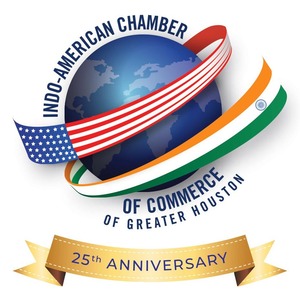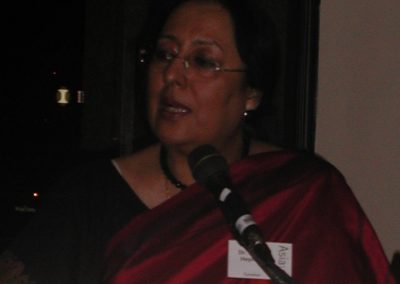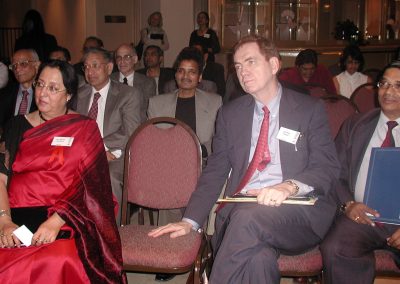Dr. Najma Heptulla “Democracy cannot be imposed, it has to come from within the society”
The Indo American Chamber of Commerce of Greater Houston (IACCGH) and Asia Society jointly arranged a reception at the Westin Oaks Hotel on March 24th, 2003. The reception provided a wonderful opportunity for local Indo Americans and Asia society guests to meet Dr. (Mrs.) Najma Heptulla, Member, All India Congress Committee and Deputy Chairperson of the Upper House of the Indian Parliament. The fifty odd attendees ranged from local businessmen, media representatives to Consul Generals of different countries. The topic for the evening was �Democracy and Globalization�. Mr.Charles Foster of Asia Society introduced the Speaker who has been a Member of Parliament since 1973 and has many credentials to her credit. Mrs. Heptulla who has been to Houston several times before, wanted to interact with not only Indians but also main stream Americans. She has spent a lot of time propagating the Indian culture and learning about other cultures. She sincerely believes that the whole world is one big family – �Vasudeva Kutumba�. She is the first woman to be elected President of the Inter-Parliamentary Organization and has been President for the past three years. This is a great honor and achievement and she is very proud that in today�s world, women can be and are successful. She pointed out that in the East, there are more women in powerful positions in politics that in the West. On the subject of Democracy and Globalization, Dr. Heptulla said that no other country has as much diversity as India. In spite of the many challenges in a country of its size, Democracy still flourishes there. Democracy and Globalization can and still work together. There are a lot of misgivings regarding the World Trade Corporation and problems that will have to be smoothened out over time. Widely accepted new trade requirements are not homogenous. Trade is neither free nor fair. It tends to ignore the different stages of development. She said we need to recognize that the needs of the developed countries are very different from the needs of the developing countries. The latter are reeling under the weight of regulations that do not address their concerns. Globalization will work only when the purchasing power of the developing countries improve. The developed countries need to take on the responsibility to see that the developing countries improve, because until they do, their purchasing power is limited. Globalization should not be just monetary, but should have a human face. She mentioned that India has moved towards liberalization and many nationally owned companies are scheduled to be sold to private entrepreneurs. Many of the parliamentarians are not in favor of this move because the Government owned companies have the social responsibility of taking care of their employees, which most likely will not happen when these Companies go into private hands. But, she said that in order to make economic progress, it is necessary to globalize. India has done very well in fields such as IT, Software Engineering and Biotech, and opportunities exist for such success in other fields as well. In response to questions from the audience, she stressed on the fact that the Government of India does offer subsidized education and medical support to its employees. In the past this was possible because the Indian Industries had a captive market, but world competition has now become so keen, that in order to give the workers the same benefits, it is necessary for India to globalize. She also mentioned that in India, new women entrepreneurs are coming in but protective measures need to be put in place to ensure that they are not exploited by the Multinational companies. She drew attention to the fact that India has always been democratic. Democracy started with the Village Panchayats – A council of five elders of the community, who were considered the wise men and who solved problems in a democratic way. Democracy cannot be imposed, it comes from within society said Dr. Heptulla. In closing Dr. Heptulla said that she would like to see more inter-action among the countries, as such interaction is necessary for countries to understand each other. We should have not just cultural expeditions, but cultural dialogues. She recognizes the role of Asia Society and would like to see one in India. Jagdip Ahluwalia, President-Elect of IACCGH was the moderator for the evening and gave the vote of thanks. This was the first program the Indo-American Chamber has co-hosted with Asia Society and the Chamber plans to do more in the future. For more information on the IACCGH please visit: www.iaccgh.com You can learn more about the Chamber and its activities at www.iaccgh.com or call 713-624-7131





